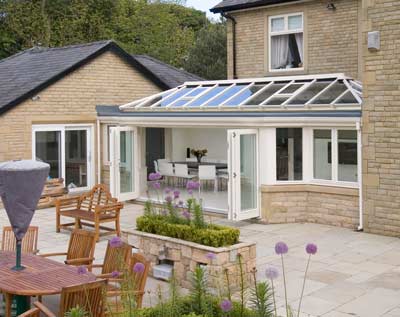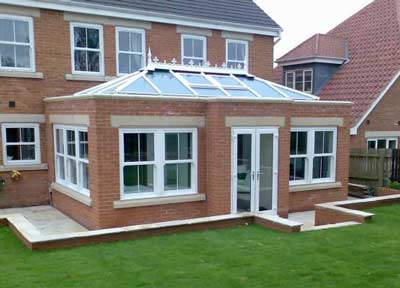Orangery Conservatories in High Wycombe
 The Bahama "Ultraframe" orangery is a great way to add conservatory-style light and space to your home and offers a new slant on traditional conservatories. These innovative structures seem to have become increasingly popular in High Wycombe, perhaps due to their interesting mix of practical properties, sunlight and privacy.
The Bahama "Ultraframe" orangery is a great way to add conservatory-style light and space to your home and offers a new slant on traditional conservatories. These innovative structures seem to have become increasingly popular in High Wycombe, perhaps due to their interesting mix of practical properties, sunlight and privacy.
An orangery is an atrium-style conservatory, where your adjoining rooms flood with light and bring you the feeling of grandeur that comes from its height. They offer greater privacy than conservatories yet the interior height provides a breathtaking focal point through which light floods in to your home
Bahama's orangeries, like conservatory styles, are both traditional and contemporary, falling somewhere between a conservatory and a traditional extension. Your orangery will offer a seamless link between your home and garden.
The word 'orangery' comes from the 16th century, when European aristocrats collected citrus trees. Initially, these orangeries (as the collection of trees was known) stayed in the gardens. But with the introduction of plant pots, they could be brought indoors into special rooms perfect for cultivating citrus trees in cooler climates.
Customer Recommendation: "Excellent service backed by superb product. Have used them before on two properties. Will use them again!"
For Patio door security click here
The orangery have their roots in 17th century Holland, when relations between the Dutch and the British were good. The concept, however, seem to be much older as there are records of buildings similar to orangeries in 14th-century France. In fact even the Romans built glorified greenhouses The earliest known orangery dates from the late 16th century and was built for the Surrey garden of Sir Francis Carew, whose friends brought back orange seeds from their trips abroad.
Orangeries really took off in the 17th century, when orange trees began to be imported from Southern Italy. These plants wouldn't live through a British winter, so gardeners had to find a way to protect them.

The result was the first orangeries, constructed with south-facing windows to make the most of the sparse sunlight. In these orangeries, plants grew in pots so they could be transported outdoors in summer. For extra protection from the British winter, the orangery roof was filled with straw for insulation and the orangery's shutters would close at night. The early 19th century, some orangeries had underfloor heating, but their popularity was on the wane. Orangeries needed large, south-facing gardens, which meant they weren't always attached to the house, unlike conservatory styles. A further boost for conservatories was the abolition of window tax in 1845.
Today's orangeries, like conservatory styles, are generally buildings with glazed sides and brick or wood supports. Orangeries use less glass than modern conservatory styles.
Stand out from the crowd and choose a Bahama "Ultraframe" Orangery.





 Bahama
Bahama